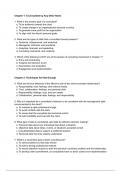Chapter 1: A Consultant by Any Other Name
1. What is the primary goal of a consultant?
a. To be authentic towards the client
b. To create change in an organizational structure or policy
c. To generate more profit for the organization
d. To align with the clients' personal goals
2. What are the types of skills that a consultant should possess?
a. Technical, interpersonal, and analytical
b. Managerial, technical, and emotional
c. Analytical, financial, and leadership
d. Consulting, teamwork, and creativity
3. Which of the following is NOT one of the phases of consulting mentioned in Chapter 1?
a. Entry and contracting
b. Analysis and decision to act
c. Examination and evaluation
d. Engagement and implementation
Chapter 2: Techniques Are Not Enough
4. What are the four elements of the affective side of the client-consultant relationship?
a. Responsibility, trust, feelings, and external needs
b. Trust, collaboration, feelings, and personal data
c. Responsibility, feelings, trust, and own needs
d. Collaboration, personal data, feelings, and responsibility
5. Why is it important for a consultant's behavior to be consistent with the management style
recommended to the client?
a. To maintain a rigid professional image
b. To avoid conflicts with the client
c. To ensure that the consultant has technical control
d. To build credibility and trust with the client
6. What type of data is considered valid data for effective decision making?
a. Personal data about how individuals feel about a situation
b. Objective data about ideas, events, or situations accepted as fact
c. Unsubstantiated data to support a preferred decision
d. Technical data that only experts understand
7. What is a secondary goal of each consulting act?
a. To solve problems so they stay solved
b. To build a strong professional network
c. To ensure attention is given to both the technical / business problem and the relationship
d. To develop client commitment, as consultants have no direct control over implementation
, 8. Which role requires consultant and manager collaboration, joint decision-making, and
two-way communication?
a. Expert role
b. Manager role
c. Pair of hands role
d. Collaborative role
Chapter 3: Flawless Consulting
9. What is the primary benefit of being authentic as a consultant?
a. To secure more clients for future consultations
b. To increase your personal profit
c. To build higher trust with the client
d. To gain control over the client's decisions
10. In addition to being authentic, what does a consultant need knowledge of during each
phase of a consulting project?
a. Financial management
b. Client's personal life
c. Task requirements of each phase
d. Competition in the industry
11. What are the four general areas in which a consultant is expected to help the client?
a. Entertain, educate, engage, and execute
b. Solve technical problems, create organizational possibilities, teach the client, improve
resource management
c. Consult, advise, implement, and lead
d. Analyze data, design solutions, communicate with stakeholders, and measure outcomes
Chapter 4: Contracting Overview
12. What is not a key ground rule for contracting mentioned in the book?
a. You can't ask for what the other doesn't have
b. You can’t contract for behavior
c. Contracts should share responsibility 50/50
d. You can’t contract with someone who is not in the room
13. What are the two basic elements that contracts must contain to be considered valid?
a. Power dynamics and clear objectives
b. Mutual consent and valid consideration
c. Detailed schedules and access to information
d. Confidentiality agreements and operational partnerships
Chapter 5: The Contracting Meeting





